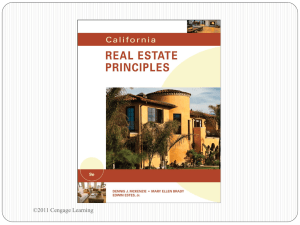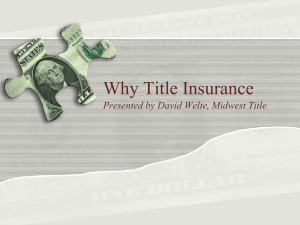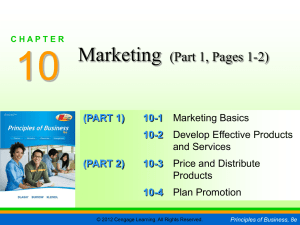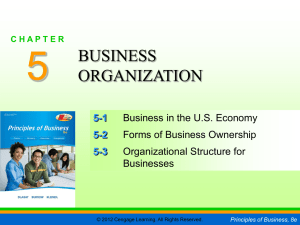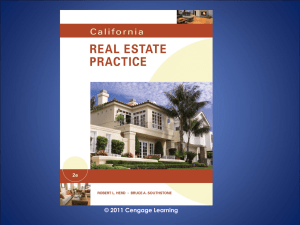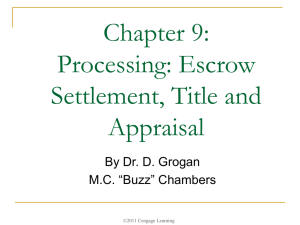California Real Estate Principles, 9th Edition
advertisement
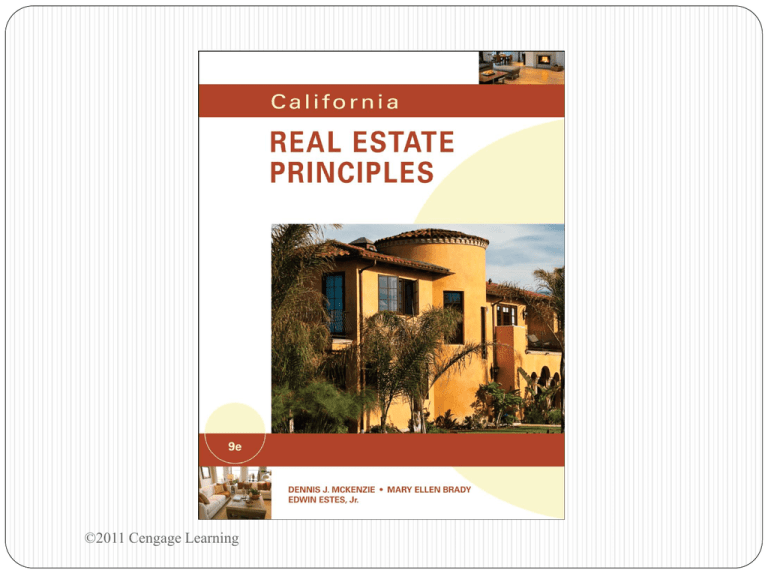
©2011 Cengage Learning California Real Estate Principles Chapter 10 The Role of Escrow and Title Insurance Companies ©2011 Cengage Learning Chapter 10 1. 2. 3. 4. Define escrow and list the legal requirements for a valid escrow. Describe the basic services provided by title insurance companies. Explain the differences between a CLTA standard and an ALTA extended coverage title insurance policy. Explain various closing costs and indicate who normally pays for each closing cost. ©2011 Cengage Learning LEGAL REQUIREMENTS FOR VALID SALE ESCROW 1. Binding contract between Buyer and Seller 2. Conditional Delivery of 1. Money: Deposit funds and monies 2. Documents: Transfer instruments Remember that . . . Escrow instructions are confidential The escrow agent must be strictly impartial agent for both buyer & seller The escrow agent may not give tax, law or real estate advice to either party ©2011 Cengage Learning Escrow Disagreements Escrow agent cannot give legal advice. Halt until mutual agreement. Interpleader: Legal court action to resolve dispute between the parties. ©2011 Cengage Learning Who May Act Escrow Laws Corporation Independent* Corporation Commissioner Bank Saving ** &** Loan Title** Real** Attorney Insurance Estate ** Company Broker FSLIC Commissioner Bank Commissioner Insurance Commissioner Bar Association Real Estate Commissioner *License by Corp. Commissioner **Exempt from escrow licensing law. ©2011 Cengage Learning Only if Broker is involved in the Transaction Different Practices Northern California Escrow handled by Title insurance Co Southern California Escrow handled by Independent escrow co. or Title co. or Broker-owned escrow co. ©2011 Cengage Learning TYPES OF ESCROWS Residential Sales Liquor License Bulk Sale Re-Finance Income Property Business Opportunity Exchange Probate Commercial Industrial Land Sales ©2011 Cengage Learning ESCROW Neutral Third Party – Stakeholder Closing costs are usually negotiable Provides custodian for funds and documents Provides Clearing House for Payments Acts as an Agent for Prorations ©2011 Cengage Learning LIFE OF AN ESCROW Prepare Escrow Instructions and Pertinent Documents Obtain Signatures Order Title Search Receive and Review Preliminary Report Request Demands (if any) Request Clarification of Other Liens (if any) and Review Taxes on Report Receive Demands and Enter into File ©2011 Cengage Learning Process Financing Continued . . . LIFE OF AN ESCROW continuation Process Financing Request Beneficiary Statement Request/or Prepare New Loan Application Receive Beneficiary Statement and Enter into File, Review Terms of Transfer and Current Payment Status Obtain Loan Approval and Determine that Terms are Correct Request Loan Documents ©2011 Cengage Learning LIFE OF AN ESCROW (cont) Financing Title Review File To Determine that All Conditions Have Been Met and that All Documents are Correct and Available for Signature Termite inspection, contingencies released, fire insurance ordered additional documents (2nd T.D. bill of sale etc.) have bee ordered Compute Prorations (Costs and Charges) and Request Signatures on all Remaining Documents Forward Documents To Title Company ©2011 Cengage Learning Obtain Funds From Buyer Return Loan Documents LIFE OF AN ESCROW (cont) Request Loan Funds Receive Loan Funds Order Recording of Deed and Other Documents Close File Prepare Statements and Disburse Funds ©2011 Cengage Learning Complete Closing Forward Final Documents to All Interested Parties (Buyer Seller Lender) ESCROW FUNCTIONS A depository for funds and documents. Clearinghouse for documents and funds Calculate and compute closing costs Prepare escrow instructions Order status of loans and beneficiary demands Process termite, home inspection & pest control reports Prepares financing instruments Order title search and buyer preliminary title report Transfer impounds Requests hazard insurance policies Computes prorations Obtains documents and prepares Deeds to be recorded Disclose Appraisal ©2011 Cengage Learning Escrow Functions Collects monies needed to close Request new loans Prepare closing statements File Non-Foreign Status certificate Execute Bill of Sale for inventory and/or personal property Disburses monies and documents after close Disclose Appraisal File Change of Ownership Tax Assessor Data Report Funds to IRS ©2011 Cengage Learning TERMINATION OF ESCROW Full Performance of the sale, exchange or refinance Mutually agreed - Cancellation Revocation or Refusal by one party; Legal problems ©2011 Cengage Learning Non-Recurring CLOSING COSTS Non-Recurring = One Time Costs Loan Fees Appraisal Report Credit Report Pest Control Escrow Fee Tax Service Fee Drawing, Notary, Recording Fees Title Insurance Policy Fee Broker Commission Transfer Tax Note: ALL costs are negotiable between the parties unless restricted by the loan. ©2011 Cengage Learning Recurring CLOSING COSTS Recurring = Continue repeated costs Insurance : Hazard, Flood, Mortgage (MIP, PMI) Property Taxes Interest on Loans Impound Deposits Note: ALL costs are negotiable between the parties unless restricted by the loan. ©2011 Cengage Learning PRORATIONS Equitable division of costs Every month = 30 Days Every Year = 360 Days # of Days x Rate Per Day = Share of Expense Common items prorated: association dues, interest, taxes, insurance & prepaid rent Credit is an Entry Made in Favor of the Party Debit is an Entry to be Paid by the Party Deeds typically record at 8:00 a.m. ©2011 Cengage Learning TYPICAL CLOSING STATEMENT Buyer Seller Debit Credit Debit Credit Prepaid rents Documentary transfer tax Prepayment penalties Termite inspection/correction Seller’s CLTA title ins policy Brokerage commission Recording Fees xxxx Payoff of Existing Loan Discount points xxxx Any “seller pays” fees Seller’s Net Proceeds ©2011 Cengage Learning xxxx xxxx xxxx xxxx xxxx xxxx xxxx xxxx xxxx xxxx xxxx xxxx TYPICAL CLOSING STATEMENT Buyer Seller Debit Credit Debit Credit Sales Price xxxx xxxx Buyer’s initial deposit xxxx Buyer’s new loan xxxx Balance of Buyer’s Deposit xxxx Appraisal xxxx Loan origination fee xxxx New fire Ins. Policy xxxx Credit report xxxx Drawing Fee/Notary xxxx Lender’s ALTA Title xxxx Any “buyer pays” fees xxxx Tax service & impounds xxxx ©2011 Cengage Learning TITLE INSURANCE PROCESS Search Examine Chain of Title Preliminary Title Report Escrow Title Policy ©2011 Cengage Learning TITLE COMPANY BASIC FUNCTIONS To assure marketable title Search and Gather Title Records Courthouse search Title Plant search Examine and Interpret Title Records Compile a Chain of title Identifies existing encumbrances Issue a Preliminary Title Report with encumbrances Issues insurance policies Insured against defects in title Additional assurance over seller’s representations Escrow the Real Estate Transaction Collect all instruments of transfer Close transaction ©2011 Cengage Learning TITLE INSURANCE COVERAGE CLTA Standard Coverage Types: Owner’s * Lender’s * Joint Protection Risks Insured against • Undisclosed public record • Forgery • Incompetence of Parties • Marketable Title • Street Access NOT Insured: • Matter not of public record • Zoning and use of the property • Mining and water claims • Undisclosed KNOWN defects not revealed to title company ©2011 Cengage Learning TITLE INSURANCE COVERAGE ALTA Extended Coverage Types: ALTA Lender’s * ALTA-R Homeowner's Risks Insured against • All Items under standard coverage, plus • Unrecorded liens & encumbrances not shown in the • • • • • courthouse Potential mechanic’s liens Easement by prescription Encroachments and adverse possession Parties in possession, other than the property owner(s) Mining claims & water rights NOT insured: • Zoning and property use • Known defects not disclosed to title company ©2011 Cengage Learning Review Quiz Chapter 10 1. Which of the following is not exempt from the escrow licensing law? (a) trust companies (b) escrow companies (c) title insurance companies (d) real estate brokers when acting as an agent in the transaction ©2011 Cengage Learning Review Quiz Chapter 10 2. A history of title transfers for a particular parcel of land is a/an: (a) preliminary report (b) title insurance policy (c) abstracter index (d) chain of title 3. Which insurance policy requires the title company to make a physical inspection of the property? (a) CLTA (b) standard (c) RESPA (d) ALTA ©2011 Cengage Learning Review Quiz Chapter 10 4. There are certain requirements that must be met before a transaction can be placed in escrow. They are: (a) a binding contract between buyer and seller (b) a neutral third party is employed (c) conditional delivery of all documents related to sale (d) all of the above 5. Which of the following is normally paid by the seller? (a) prepayment penalty (b) credit report fee (c) recording fee for the trust deed (d) loan origination fee ©2011 Cengage Learning Review Quiz Chapter 10 6. When an escrow officer receives conflicting instruction that cannot be resolved by the parties, the escrow officer can file a legal action in court called: (a) arbitration (b) hold harmless (c) interpleader (d) settlement suit ©2011 Cengage Learning Review Quiz Chapter 10 7. Which law prohibits a real estate agent from receiving a referral fee from an escrow or title company? (a) Truth in Lending (b) Regulation Z (c) RESPA (d) all of the above 8. Title insurance does not cover publicly disclosed: (a) easements (b) zoning ordinances (c) deeds of trust (d) corporation commission ©2011 Cengage Learning Review Quiz Chapter 10 9. Title insurance rates are set by: (a) title companies (b) insurance commissioner (c) real estate commissioner (d) corporation commissioner 10. On behalf of the buyer and seller, the escrow officer acts as: (a) an employee (b) an independent contractor (c) an agent (d) a licensee ©2011 Cengage Learning Review Quiz – Chapter 10 Answers 1. B 6. C 2. D 7. C 3. D 8. B 4. D 9. A 5. A 10. C ©2011 Cengage Learning
